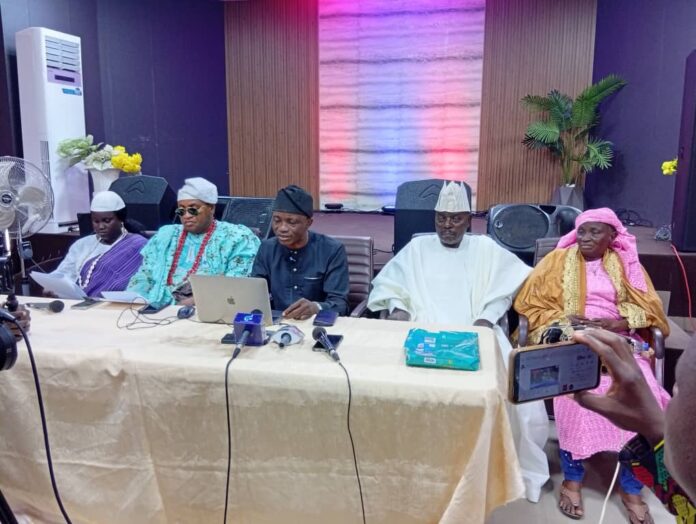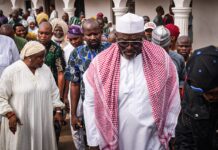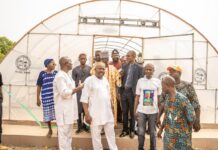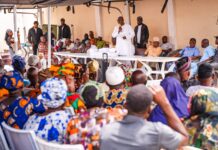Lekan Yusuf, Ibadan
In a powerful and fiery address delivered at a world press conference convened by the Yoruba Self-Determination Movement (YSDM), several Yoruba dignitaries and traditional advocates firmly rejected the notion that Lagos State is a “no man’s land,” instead asserting the state’s irrefutable place within Yorubaland.
The event, which took place amid growing ethnic tensions and resurging debates over land ownership, saw the attendance of prominent Yoruba figures including Yeye Yemisi Ajibola, Osunfunke Efuntolase, Prince Dr. Joseph Ayo Coker (Secretary, YSDM), George Ifeoluwa Akinola (Publicity and Media, YSDM), and Bashorun Kunle Adesokan.
The conference, themed “The Battle for the Real Soul of Lagos State”, was a direct response to what the organizers described as “revisionist” claims and political maneuverings aimed at undermining the Yoruba identity of Lagos.
Prince Dr. Joseph Ayo Coker, speaking on behalf of the YSDM, stated emphatically: “Lagos is not a no-man’s land. Lagos is Yoruba land — culturally, historically, ancestrally, and spiritually. Any narrative to the contrary is false, divisive, and dangerous.”
The group traced Lagos’ roots to indigenous Yoruba subgroups such as the Awori, Ijebu, Egba, Ilaje, and Egun, dismissing historical claims of Bini or Igbo sovereignty over the area.
The YSDM praised the 2023 re-election of Governor Babajide Sanwo-Olu as a decisive moment for the Yoruba people, following the Labour Party’s surprise win in the presidential election in Lagos. The group said it signaled a “Yoruba awakening” and a rejection of perceived external political dominance.
“Had Labour won, Yoruba interests would have been sidelined. The people rose — from churches to mosques to Isese groves — to defend our land,” the statement read.
The group endorsed recent steps taken by the Lagos State House of Assembly under Speaker Mudasiru Obasa, including translating Assembly laws into Yoruba, passing laws that prioritize indigenous Yoruba interests in land ownership, market access, and economic participation, and reversing policies and street names perceived to honor non-Yoruba influences over Lagos.
The YSDM specifically commended the Assembly’s stance on regulating land ownership by non-indigenes, likening it to similar policies in the UAE, Israel, and parts of South Africa.
The press statement issued strong words to non-Yoruba groups—particularly Igbo communities in Lagos—accusing some of attempting to politically and economically dominate the state. It condemned events such as the planned “Igbo Century Celebration” in Lagos as “provocative” and called for such cultural events to be held in Igbo states.
“No market in Yorubaland should be 100% owned by another ethnic group. That’s a recipe for ethnic hostility,” they warned.
The movement also renewed calls for the unconditional release and political rehabilitation of Chief Sunday Adeyemo (a.k.a. Sunday Igboho), describing his persecution as unjust and politically motivated. They demanded the removal of his name from Nigeria’s wanted list and unfreezing of his bank accounts.
“He stood for our people when no one else did. He is a hero, not a criminal,” the group declared.
The event concluded with a renewed call for restructuring or, if necessary, peaceful exit from Nigeria. “The Yoruba people are ready to extricate themselves from the impossible union of Nigeria. We will not be subdued, we will not be erased.”
In their final remarks, dignitaries present gave stirring affirmations of Yoruba pride and unity. Yeye Yemisi Ajibola said, “We invoke our ancestors. We will defend our land with wisdom, spirit, and unity.” Osunfunke Efuntolase added, “This is more than politics. It is about heritage, survival, and honor.” George Ifeoluwa Akinola affirmed, “The world must know — Lagos is Yoruba, and that will never change.”
This statement and its tone reflect heightened ethnic tensions in Nigeria, and while cultural and political advocacy is a right, peace and mutual respect across ethnic groups remain essential for national unity.
The federal government has yet to respond to the conference.






